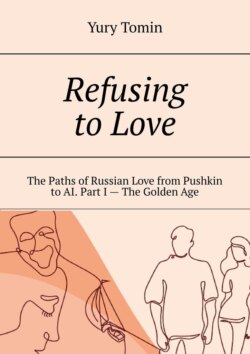Читать книгу Refusing to Love. The Paths of Russian Love from Pushkin to AI. Part I – The Golden Age - Yury Tomin - Страница 4
II
ОглавлениеLove Triangle. The American Angle of Love. The Yalom family as the prism of American society. A grafting of the world’s best patterns. The therapy of love misery. Techniques of normative love. The living connection of times and spaces
Irvin and Marilyn Yalom
Let us see where this seemingly random line of coincidence of questions about the origin of love can lead us. We are facing a peculiar international love triangle: love was invented by the French, this ancient invention excites modern Americans, the Russians deny love inoculation from outside and proclaim their own special kind of love. Perhaps these three different abodes of love can serve as quite exhaustive sources of information about what is wanted of it, how it is treated and how love survives in the modern world.
Since we have the American angle of love, let us sketch it in general terms. To get an idea of its gradations and formative vectors, we simply need to get to know Irwin and Marilyn Yalom and their areas of interest. The issues that Marilyn dealt with professionally lay in the field of gender studies and the history of the position of women in societies of different cultures. In particular, she wondered «how marriage, once considered a religious duty in medieval Europe, evolved into a sense of personal fulfillment in contemporary America.» Marilyn’s Stanford University colleagues noted her fascination with «the 18th-century French salon culture where women played a leading role in organizing events of intellectual discourse,» and her attempts to instill these traditions in her community.
Her husband is a well-known existential psychotherapist who has observed the experiences of his patients as they face the inevitability of death, as they face isolation in their own inner world, as they struggle with life choices, and as they strive for love. Summarizing his findings, Irwin Yalom reveals the tragic disconnect inherent in Americans between their trust in love and their destructive dependence on love. The cause of love’s frustrations lies in the relaxed perception of love as a spark of spontaneous infatuation and exclusive strong attachment. Such closed love is doomed to self-destruction. True love, according to Irvin Yalom, «is rather a form of existence: not so much attraction as self-giving, a relation not so much to one person as to the world as a whole.»
To generalize the American angle of the love matters, there is a desire both to import the world’s best examples and to invent original formats of love, as well as a preference for getting rid of love diseases and achieving some kind of normal state of love with the tools of some pragmatic scientific or pseudoscientific school of psychotherapy.
Irvin Yalom himself would hardly have had the opportunity to experience the joys of family longevity if his parents had not immigrated from the Russian Empire in the midst of World War I. At the same time, the Silver Age of Russian spiritual culture began to decline, completing the long cycle of the Golden Age of its heyday, the beginning of which matured in the circles of the then high-society (aristocratic) community, inspired by French fashions and customs, as well as a military victory over the ruler of the minds – Napoleon.
